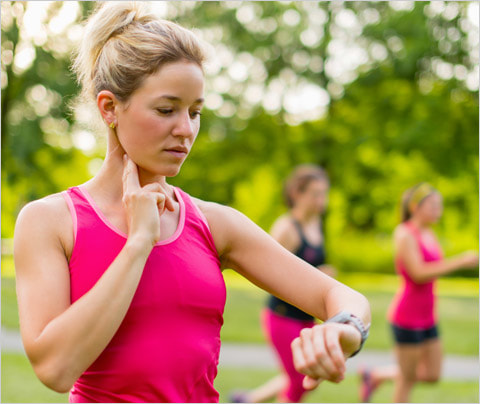|
We have an eye for every little detail, such as calories burnt, distance covered and speed, except for heart rate while running on the treadmill. Already perspiring and out of energy, heart rate would be the last thing in our priority list right then. But, knowing the right rate can help you with other information as well about your body.
Never push yourself too much that you finally experience breathlessness, pain or inability to workout as long as you had planned to. These convey just one fact-you are not fit enough to withstand the exercise intensity to which you have subjected yourself to! Heart rate is nothing but the measure of how quickly your heart is beating. Our hearts keep pumping oxygenated blood more quickly to match the demands of the activity done and this can also protect our heart from cardiovascular problems. Overdoing it can sometimes even negate the positive effects of physical activity on our body. Age Defines Your Heart Rate Resting Heart Rate Knowing your target heart rate helps you get your exercise numbers just right, neither permits you to over-exercise nor allows you to under-perform. The basis for all this is resting heart rate, the number of times your heart beats per minute while at rest. The best time to get this checked is as soon as you get up in the morning and right before going to bed in the night. For all individuals above 10 years of age, the resting heart rate is normal if it is anywhere between 60 and 100 beats per minute while it should be 40-60 beats/min for well-trained athletes. Target Heart Rate Check your pulse by placing two fingers on the side of your neck or on your wrist and counting the numbers for 15 seconds. Multiply this number by six to find beats per minute. Get your maximum heart rate by subtracting your age from 220. You would prefer to stay between 50 and 85 percent of your maximum heart rate which gives your target heart rate. For example, if you are 20 years old, your maximum heart rate would be 200 (220-20) and your target heart rate would be anywhere between 100 and 170 beats per minute. Heart rate during moderate-intensity exercise is about 50-69% of your maximum heart rate and heart rate during hard physical activity is about 70% to less than 90% of maximum heart rate. Math & Numbers While these heart rates are reliable, they are not most accurate and might make you over- or under-train. Extremely high heart rate numbers denote that you’re straining too much and its time to slow down. If you feel that you are under-performing, you need to push yourself further or exercise harder. Start exercising in the lower ranges of your target zone (50 percent) and gradually proceed to the higher ranges (85 percent). Almost after six months or so, you would be able to exercise comfortably at up to 85 percent of your maximum heart rate. Your response/feeling while exercising is as important as the numbers on the heart rate monitor. Two persons doing the same workout might feel differently. Anytime when your body indicates you to slow down or take a break regardless of your heart’s rate, please do so. Some other factors that indicate your exercise pace include:
Comments are closed.
|
AVOID FRAUD. EAT SMART.+91 7846 800 800
AuthorDietitian & Nutritionist Dr. Nafeesa Imteyaz. Archives
November 2022
Categories
All
Dr. Nafeesa's Blog @blogspot |
- Home
- Written Testimonials
- Consult
- Clinics
- Blogs
-
Diet & Nutrition
- Diabetes Reversal
- IVF IUI not needed for PCOS PCOD Infertility
-
Medical Nutrition
>
-
Disease & Conditions
>
- Infertility | PCOS
- Diabetes Mellitus
- Cholesterol
- Hypothyroid
- Kidney Problems
- Hypertension
- Cardiovascular Diseases
- Liver Diseases
- Gastro intestinal disorder
- Cancer
- Metabolic Disorders
- Orthopedic Disorders
- Eating Disorders
- Dietary Recall
- Weight Record Filled By Clients
- Online Payment Transaction Details
- Online Clients Weight Check Form
- Our Program Package Service Charges
- Weight Record 2017 Clients
- Measurements sent by Clients
- Terms & Conditions Of Payment
- Thanks. Your Form is Submitted
- Video Testimonials
- Lifestyle & Wellness
- Lifestyle & Wellness Blog
- Allergy & Intolerance
- Weight Loss / Gain
- Weight Loss / Slimming Blog
-
Disease & Conditions
>
- Life Cycle Nutrition >
- Sports Nutrition >
- Integrity in Nutrition
- Knowledge Centre
© COPYRIGHT 2022. ALL RIGHTS RESERVED. FRST HEALTHCARE PVT LTD.
Dr. Nafeesa Imteyaz of First Eat Right clinic, is the Best Dietitian Nutritionist in Bangalore. Best Dietitian Nutritionist in Pune. Best Dietitian Nutritionist in Hyderabad. Best Dietitian Nutritionist in Chennai. Best Dietitian Nutritionist in Mumbai. Best Dietitian Nutritionist in Delhi. Best Dietitian Nutritionist in Kolkata.


